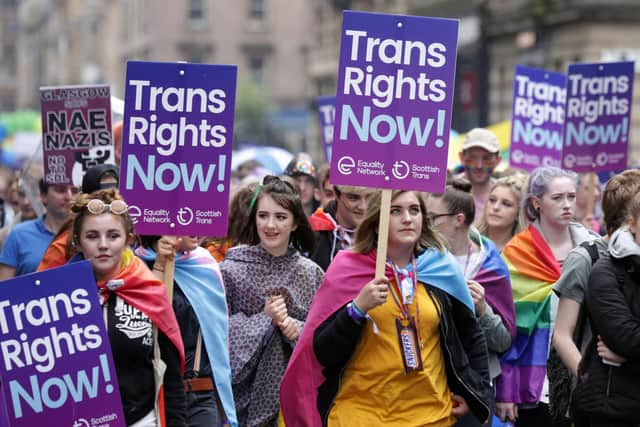UK Government to block Scottish Parliament’s Gender Recognition Reform over ‘significant impact’ on ‘GB-wide equalities’
In a move that will spark yet another constitutional battle between the SNP and Westminster, the Scottish Secretary Alister Jack confirmed ministers would be making its first ever use of a Section 35 order, which stops a Scottish bill from becoming law.
Nicola Sturgeon labelled the move a “full-frontal attack” on the Scottish Parliament, and warned it could be the first of many.
Advertisement
Hide AdAdvertisement
Hide AdAnnouncing the decision, Mr Jack said: “I have decided to make an order under section 35 of the Scotland Act 1998, preventing the Scottish Parliament’s Gender Recognition Reform (Scotland) Bill from proceeding to Royal Assent.


“After thorough and careful consideration of all the relevant advice and the policy implications, I am concerned that this legislation would have an adverse impact on the operation of Great Britain-wide equalities legislation.
“Transgender people who are going through the process to change their legal sex deserve our respect, support and understanding. My decision today is about the legislation’s consequences for the operation of GB-wide equalities protections and other reserved matters.
“I have not taken this decision lightly. The Bill would have a significant impact on, amongst other things, GB-wide equalities matters in Scotland, England and Wales. I have concluded, therefore, that this is the necessary and correct course of action.
“If the Scottish Government chooses to bring an amended Bill back for reconsideration in the Scottish Parliament, I hope we can work together to find a constructive way forward that both respects devolution and the operation of UK Parliament legislation.
“I have written today to the First Minister and the Scottish Parliament’s Presiding Officer informing them of my decision.”
MSPs voted to pass the Gender Recognition Bill by 86 votes to 39 in December last year, making it easier for people to obtain a gender recognition certificate to change their legally recognised gender.
The changes lower the age that people can apply for a GRC from 18 to 16, and also remove the need for a medical diagnosis of gender dysphoria.
Advertisement
Hide AdAdvertisement
Hide AdMr Jack has now written to the First Minister explaining the decision, in which he explained the UK Government hoped to avoid using the section 35 order.
He said: “I would have preferred not to have been in this situation. We do all we can to respect the devolution settlement and resolve disputes.
"As you know this is the first time section 35 power has been used, and I recognise this a significant decision, but it was included by the architects of the Scotland Act to ensure in a situation like this that there is a mechanism to ensure devolved law, and the law of the United Kingdom, could work effectively."
He added: “The Bill also risks creating significant complications from having two different gender recognition regimes in the UK (especially given your Bill would allow 16 and 17 year olds to change their legal sex, unlike in the rest of the UK) and allowing more fraudulent or bad faith applications.”
The senior minister is now expected to lay an order before the Westminster parliament on Tuesday to prevent the bill being sent to the King for Royal approval.
In it, he will set out what ministers consider to be the “adverse effects” of the Gender Recognition Bill, including on the operation of single-sex clubs, associations and schools, protections such as equal pay and single-sex spaces.
Responding on Twitter, Ms Sturgeon labelled the move an “attack” on Holyrood.
She said: “This is a full-frontal attack on our democratically elected Scottish Parliament and it's ability to make it's own decisions on devolved matters.
Advertisement
Hide AdAdvertisement
Hide Ad“@scotgov will defend the legislation & stand up for Scotland’s Parliament. If this Westminster veto succeeds, it will be first of many”.
LGBT+ charity Stonewall said the move “treats trans people as a threat to be contained, not citizens to be respected”.
In a statement, they said: “The UK Government should be focused on developing and implementing a strategy that improves the lives of all LGBTQ+ people, including trans people, not causing them more harm.
“Twenty years on from the repeal of Section 28, the Prime Minister will re-toxify his party’s brand by repeating historic mistakes for LGBTQ+ people. This is out of step with the inclusive values of modern Britain.”
Scottish Trans, the trans equality project of LGBTI equality and human rights charity the Equality Network, condemned the move.
Vic Valentine, Manager of Scottish Trans, said: “The bill as passed would introduce a simpler and fairer way for trans men and women to be legally recognised as who they truly are, allowing them to live with the dignity we all deserve.
“It was passed by the Scottish Parliament by 86 votes to 39, with the overwhelming support of the SNP, Labour, the Greens and the LibDems. That followed years of consultation, and lengthy Parliamentary consideration and debate. The bill covers matters that are devolved to the Scottish Parliament, and its consequences were considered by MSPs in great detail.
“For the UK Government to seek to block the Scottish democratic process in this way, simply because they disagree with the welcome decision the Scottish Parliament has made to improve trans people’s lives, is unacceptable. We fully expect the Scottish Government to challenge this in the courts.”
Advertisement
Hide AdAdvertisement
Hide AdLast weekend saw the UK Government’s former LGBT adviser warn blocking the Bill would damage the UK’s international reputation.
Iain Anderson, now chair of LGBT+ charity Stonewall had called for ministers to instead adopt an approach that allows trans people to be “respected”.
Comments
Want to join the conversation? Please or to comment on this article.
